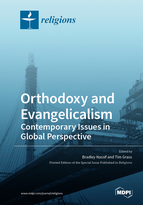Orthodoxy and Evangelicalism: Contemporary Issues in Global Perspective
A special issue of Religions (ISSN 2077-1444). This special issue belongs to the section "Religions and Theologies".
Deadline for manuscript submissions: closed (31 May 2021) | Viewed by 48825
Special Issue Editors
Interests: Orthodox and Evangelical relations; Orthodox history, theology and spirituality; New Testament and patristic exegesis
Interests: modern religious history (currently including Evangelical-Orthodox interactions; the Plymouth Brethren and their missions; history of the Catholic Apostolic Church; history of the reformation on the Isle of Man)
Special Issue Information
Dear Colleagues:
Since the 1990s, the Eastern Orthodox and Protestant Evangelical communities have had more direct contacts with each other than at any other time. This special issue will focus on current developments and issues in specific regions of the world.
With the fall of communism in Eastern Europe, Western missionaries began flooding the former Soviet Union, Romania and other Eastern European block countries, often without consultation with existing Evangelical communities in those countries. Partly in response to this wave of Evangelical missions, a new paradigm of ecumenical relations emerged among professional theologians in America when the Society for the Study of Eastern Orthodoxy and Evangelicalism (SSEOE) was formed in 1990. Comparative theology, spirituality and missions formed the focus of the organization whose archives are now housed in Asbury Theological Seminary. In 1997, the World Council of Churches (WCC) began its first series of international dialogues between the Orthodox and Evangelical communities over concerns regarding Evangelical proselytism in Russia and Eastern Europe but also shared concerns regarding perceived theological trends within the WCC itself. Publications include Proclaiming Christ Today: Orthodox-Evangelical Consultation (1995); and Turn to God, Rejoice in Hope (1998). From 2000-2006, a second series of seminars resulted in the publication of Building Bridges: Between the Orthodox and Evangelical Traditions (2012). Theological and missiological subjects were explored, but financial constraints eventually ended these gatherings. In 2001, the Evangelical Alliance in the UK published Evangelicalism and the Orthodox Church. It was produced by a group of Evangelical and Orthodox theologians whose goal was to lay a foundation for mutual understanding by comparing and contrasting Orthodox and Evangelical beliefs and practices. Since then, the main ongoing exchange between Orthodox and Evangelicals has been that initiated in 2010 by leaders within the Lausanne Movement and the Oriental and Eastern Orthodox churches, which resulted in the formation of the Lausanne-Orthodox Initiative. Unlike other dialogues, this focuses on exploring how the two traditions can cooperate in the mission of God. A selection of past presentations appears in The Mission of God: Studies in Orthodox and Evangelical Mission (2015). However, in spite of all the work that has been done, there remains scope for further scholarly investigation; for example, few regional studies have examined areas outside the Anglophone world, or the political and legal aspects of relationships between these traditions.
The aim of this volume is to assemble a collection of scholarly essays on current issues and/or developments in Orthodox-Evangelical relations, at both global and national levels, which will inform ongoing dialogue. Essays may evaluate regional meetings, discuss the history of relationships, or consider current missiological challenges, political and legal issues, comparative theology or other topics. They may focus on (but are not limited to) relations in Russia, Eastern and Western Europe, the Middle East, Africa, North America, Australia and Greece. Sensitivity to the nuances of difference between Eastern and Western Evangelicals and Eastern Orthodox and Oriental Orthodox communities is especially welcome. The suggested length of essays is between 3,000-6,000 words, but this is flexible.
Dr. Bradley Nassif
Dr. Tim Grass
Guest Editors
Manuscript Submission Information
Manuscripts should be submitted online at www.mdpi.com by registering and logging in to this website. Once you are registered, click here to go to the submission form. Manuscripts can be submitted until the deadline. All papers will be peer-reviewed. Accepted papers will be published continuously in the journal (as soon as accepted) and will be listed together on the special issue website. Research articles, review articles as well as short communications are invited. For planned papers, a title and short abstract (about 100 words) can be sent to the Editorial Office for announcement on this website.
Submitted manuscripts should not have been published previously, nor be under consideration for publication elsewhere (except conference proceedings papers). All manuscripts are thoroughly refereed through a double-blind peer-review process. A guide for authors and other relevant information for submission of manuscripts is available on the Instructions for Authors page. Religions is an international peer-reviewed open access monthly journal published by MDPI.
Please visit the Instructions for Authors page before submitting a manuscript. Submitted papers should be well formatted and use good English. Authors may use MDPI's English editing service prior to publication or during author revisions.
Keywords
- orthodox
- evangelical
- dialogue
- mission
- theology
- history
- spirituality
- hermeneutics






